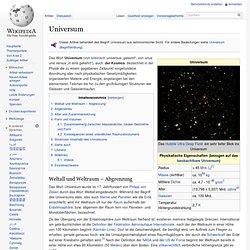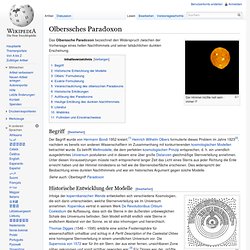

Kosmologie. Kosmologie (Physik) Diese Kategorie ist Teil der Systematik Astronomie, wo auch Tipps zum Kategorisieren von Artikeln und Anlegen neuer Kategorien im Bereich Astronomie gegeben werden.

In dieser Kategorie sollen Artikel zur Kosmologie gesammelt werden, die direkten Bezug zur Physik (bzw. ihrem Teilgebiet Astrophysik) haben. Wenn sich ein Artikel aus anderer als naturwissenschaftlicher Perspektive mit dem Thema Kosmologie befasst, dann ist er in der übergeordneten Kategorie:Kosmologie einzusortieren. Es werden 83 von insgesamt 83 Seiten in dieser Kategorie angezeigt: Universum. Das Wort Universum (von lateinisch universus „gesamt“, von unus und versus „in eins gekehrt“), auch: der Kosmos, bezeichnet in der Physik die zu einem gegebenen Zeitpunkt vorgefundene Anordnung aller nach physikalischen Gesetzmäßigkeiten organisierten Materie und Energie, angefangen bei den elementaren Teilchen bis hin zu den großräumigen Strukturen wie Galaxien und Galaxienhaufen.

Weltall und Weltraum – Abgrenzung Da der Übergang von der Erdatmosphäre zum Weltraum fließend ist, existieren mehrere festgelegte Grenzen. International am gebräuchlichsten ist die Definition der Fédération Aéronautique Internationale, nach der der Weltraum in einer Höhe von 100 Kilometern beginnt (Kármán-Linie). Allgemeines Die heute allgemein anerkannte Theorie zur Beschreibung der großräumigen Struktur des Universums ist die allgemeine Relativitätstheorie von Albert Einstein.
Alter und Zusammensetzung Form und Volumen Zusammenhang zwischen Massendichte, lokaler Geometrie und Form. Universum. Olberssches Paradoxon. Der Himmel müßte hell sein - immer !?

Das Olberssche Paradoxon bezeichnet den Widerspruch zwischen der Vorhersage eines hellen Nachthimmels und seiner tatsächlichen dunklen Erscheinung. Begriff[Bearbeiten] Der Begriff wurde von Hermann Bondi 1952 kreiert.[1] Heinrich Wilhelm Olbers formulierte dieses Problem im Jahre 1823[2], nachdem es bereits von anderen Wissenschaftlern im Zusammenhang mit konkurrierenden kosmologischen Modellen betrachtet wurde. Es betrifft Weltmodelle, die dem perfekten kosmologischen Prinzip entsprechen, d. h. ein unendlich ausgedehntes Universum postulieren und in diesem eine über große Distanzen gleichmäßige Sternverteilung annehmen. Unter diesen Voraussetzungen müsste nach entsprechend langer Zeit das Licht eines Sterns aus jeder Richtung die Erde erreicht haben und der Himmel mindestens so hell wie die Sternenoberfläche erscheinen. Siehe auch: Oberbegriff Paradoxon Historische Entwicklung der Modelle[Bearbeiten] Im 18. Alpha-Centauri: Wieso ist das Universum so dunkel?
Um Videos oder Audios abzuspielen, benötigen Sie einen Browser, der HTML5-Video abspielen kann oder eine aktuelle Version des kostenlosen Adobe Flash Players sowie aktiviertes JavaScript.00:14:37 Müsste man nicht meinen, die Sterne erleuchten das Universum?

Gibt es für die Dunkelheit irgendeinen Grund? Die Antwort lautet: Ja, es ist so dunkel, weil wir hier sind. Was haben wir damit zu tun? Category:Cosmology. There are two very different senses in which the term "Cosmology" is used.

Physical cosmology is the scholarly and academic study of questions about the ultimate fate of the universe. The subject matter of this field is studied using scholarly methodology, including the scientific method and reason. It is studied by scientists, such as astronomers and theoretical physicists; and academic philosophers, such as metaphysicians, philosophers of physics, and philosophers of space and time.Religious cosmology (or mythological cosmology) is a body of beliefs based on the historical, mythological, religious, and esoteric literature and theories about eschatology (i.e. the end of the world), including such theories, as for instance apocalypticism.
Subcategories This category has the following 3 subcategories, out of 3 total. Pages in category "Cosmology" The following 19 pages are in this category, out of 19 total. Category:Physical cosmology. Physical cosmology is the scholarly and academic study of questions about the ultimate fate of the universe.

The subject matter of this field is studied using scholarly methodology, including the scientific method and reason. It is studied by scientists, such as astronomers, and theoretical physicists; and academic philosophers, such as metaphysicians, philosophers of physics, and philosophers of space and time. Future of an expanding universe. Ultimate fate of the universe. The ultimate fate of the universe is a topic in physical cosmology.

Many possible fates are predicted by rival scientific theories, including futures of both finite and infinite duration. Once the notion that the universe started with a rapid inflation nicknamed the Big Bang became accepted by the majority of scientists,[1] the ultimate fate of the universe became a valid cosmological question, one depending upon the physical properties of the mass/energy in the universe, its average density, and the rate of expansion.
There is a growing consensus among cosmologists that the universe is flat and will continue to expand forever.[2][3] The ultimate fate of the universe is dependent on the shape of the universe and what role dark energy will play as the universe ages. Emerging scientific basis[edit] Theory[edit] The theoretical scientific exploration of the ultimate fate of the universe became possible with Albert Einstein's 1916 theory of general relativity. Observation[edit] Big Rip[edit] Theories about the end of the universe. The ultimate fate of the universe is a topic in physical cosmology.

Many possible fates are predicted by rival scientific theories, including futures of both finite and infinite duration.